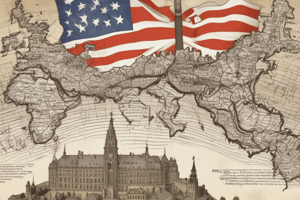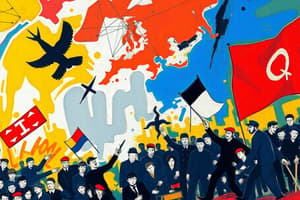Podcast
Questions and Answers
What was the strategy employed by Neville Chamberlain to avoid war?
What was the strategy employed by Neville Chamberlain to avoid war?
- Establishing alliances with the Soviet Union
- Appeasement (correct)
- Military mobilization
- Retaliation against Germany
Which significant agreement did Neville Chamberlain sign in 1938?
Which significant agreement did Neville Chamberlain sign in 1938?
- The Munich Agreement (correct)
- The Treaty of Locarno
- The Treaty of Versailles
- The Pact of Steel
What was a key outcome of Operation Barbarossa for Germany?
What was a key outcome of Operation Barbarossa for Germany?
- Total victory over the Soviet Union
- The establishment of a strong Eastern front
- Successful capture of Moscow
- The German army was significantly weakened (correct)
Which event prompted the United States to join the Allies in 1941?
Which event prompted the United States to join the Allies in 1941?
Who became Prime Minister of Britain in 1940 following Chamberlain's resignation?
Who became Prime Minister of Britain in 1940 following Chamberlain's resignation?
Flashcards are hidden until you start studying
Study Notes
Neville Chamberlain's Policy of Appeasement
- Neville Chamberlain, British Prime Minister from 1937-1940, pursued a policy of appeasement towards Nazi Germany in an effort to maintain peace.
- Appeasement aimed to satisfy Adolf Hitler's demands and prevent war.
- Chamberlain believed that concessions would prevent Nazi aggression and ultimately ensure peace in Europe.
Munich Agreement
- In 1938, Chamberlain signed the Munich Agreement with Germany, Italy, and France.
- This agreement allowed Germany to annex the Sudetenland, a region in Czechoslovakia predominantly inhabited by ethnic Germans.
- Chamberlain's appeasement policy was heavily criticized for failing to deter Hitler's aggression.
Operation Barbarossa
- Operation Barbarossa was the German invasion of the Soviet Union in 1941.
- The invasion was a major turning point in World War II, and it ultimately led to Germany's defeat.
- The operation led to the deaths of millions of Soviet civilians and soldiers, and it significantly weakened Germany's military and war potential.
US Entry into World War II
- The United States entered World War II on December 8, 1941, after the Japanese attack on Pearl Harbor.
- This attack, along with the declaration of war by Germany on the United States, marked the beginning of America's direct involvement in the conflict.
- The US entry into the war tipped the balance of power in favor of the Allies.
Winston Churchill
- Winston Churchill became Prime Minister of Britain in 1940, succeeding Chamberlain.
- Churchill was a strong advocate for resistance against Nazi Germany.
- He inspired the British people with his unwavering commitment to defeating the Axis powers.
Studying That Suits You
Use AI to generate personalized quizzes and flashcards to suit your learning preferences.




